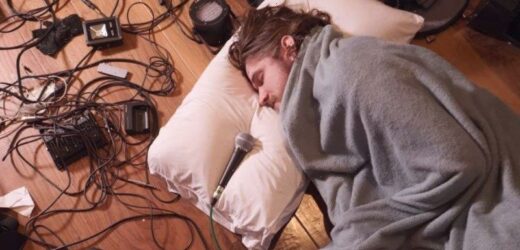The pandemic is not over, but that hasn’t stopped most shows and movies from hastily moving along with life.
Which is why it feels so jarring to be dropped right back in the middle of life in lockdown in Bo Burnham’s The Inside Outtakes, the unexpected second film of his hugely popular stay-at-home comedy/existential crisis special released in mid-2021.
The original movie, filmed over many months entirely in Burnham’s house, follows the comedian’s attempts to produce something meaningful, if for no reason other than to avoid boredom during lockdown.
With songs about FaceTiming his mother and an incredibly powerful critique (by song, of course) on the contemporary state of the internet, his work was lauded as ‘the essential document of our times’ and was seen as the bar-setter for any content released during the pandemic.
The Inside Outtakes is as hilarious and striking as Burnham’s original work, but watching it — and the many other COVID-related series that appeared on our screens over the last two years — brings a flood of emotions: anxiety, dread and that all-too-familar sense of languishing, to name a few.
Why? Put simply, that’s just how our brains work, says Dr James Collett, a lecturer in psychology at RMIT University’s School of Health and Biomedical Sciences.
“When someone has experienced an unpleasant event in their past, then when they experience an event in the present that’s kind of similar in nature … it can really take them back to that moment,” he explains.
Bo Burnham’s one-man comedy special Inside was conceived, performed and filmed during COVID lockdown – and now he’s back.Credit:Netflix
Watching content related to lockdowns and the height of the pandemic is an exercise in mapping your brain: scientists believe that memories are organised in our brains through linked nodes which connect memories and emotions to what is being taken in.
“Think of it as a map,” Collett says. “We’ve got something [lockdown content] that places us on the map, like a reminder of lockdown. Then we’re drawing … different links to things that are connected to that memory in some way.
“So lockdown might link to sitting around in pyjamas, worrying about finances, [or] feeling alone.”
Psychologists call this process a retrieval cue. “The reminder of lockdown is acting as a retrieval cue that then evokes these memories of lockdown,” Collett says.
And those memories? They’re “strongly connected” to feelings. It’s the reason watching a movie like Inside, particularly rooted in a specific time and place, can trigger the same emotions you experienced going through lockdown the first (or sixth) time.
“The thing people sometimes miss is just how emotional these experiences can be,” he says. Everyone has different ways of noticing and labelling these emotions — which means you may not even be conscious of the connected emotions when watching something like the Outtakes.
In the original Inside, Burnham sang, “If you’d had told me a year ago, that I’d be locked inside of my home, I would have told you a year ago, ‘Interesting now leave me alone’.”
A year on since the first series, audiences might be requesting the same of pandemic content.
Find out the next TV, streaming series and movies to add to your must-sees. Get The Watchlist delivered every Thursday.
Most Viewed in Culture
From our partners
Source: Read Full Article



